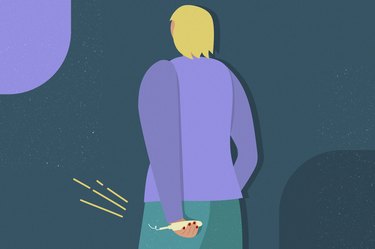
Even the most confident people can still feel shame or embarrassment when it comes to periods. Menstruation is a completely normal part of life for millions of people, yet too often it's treated as abnormal, with people made to feel humiliated for their natural bodily functions.
In fact, a 2018 poll by feminine hygiene company Thinx found that 58 percent of people who menstruate feel embarrassed by their periods, and 42 percent have been shamed by others for having a period — often by men, but also by their family members or classmates.
Video of the Day
Here, we speak to health equity experts about menstrual stigma, period shaming and period poverty, and explore how we can end these harmful perspectives once and for all.
What Is Period Shaming, Exactly?
Period shaming — also referred to as menstrual stigma or period stigma — is the name for the specific type of discrimination faced by people who menstruate. This discrimination can be subtle or overt, says Diana Lu, PhD, Chief Scientific Officer at health equity firm Cross River Strategies, but it's generally a "silencing force," similar to the taboo around mental illness.
People often associate periods with cis women, but it's an issue that encompasses people of many backgrounds and gender identities. For example, transmasculine people, trans men and nonbinary people may also menstruate and face period shaming.
One way to understand period shaming is through interpersonal, often verbal, interactions. For example, if a person who menstruates disagrees with someone who doesn't in a personal or professional setting, the latter person may claim the former is being unreasonable because they're "on their period" or "PMS-ing," to discredit their argument and portray them as irrational or overemotional.
While deeply inappropriate, this type of "joke" is a common form of period shaming that perpetuates menstruation stigma.
This harassment isn't just happening in private either; in the realm of politics, menstruation has been weaponized against female U.S. politicians, and as recently as February 2023, a Kenyan senator was asked to leave the U.K.'s parliament over a period stain, according to BBC News.
Period shaming is also deeply entrenched in many cultures, including in the U.S., where most people grow up consuming negative messages about menstruation. Many commercials for period products, for example, emphasize using "discrete" and "clean" tampons, pads or menstrual products, implying periods are secretive or inherently dirty.
Upon getting their first menstrual cycle, many young people are taught to use euphemisms for their period, like "Aunt Flo is in town" or it's "that time of the month." There are more derogatory terms, too, like "shark week" or being "on the rag."
While these expressions may seem harmless, they reinforce the cultural norm of secrecy and shame. As a result, many people hide their menstrual products, feel paranoid about leaking and are overly concerned with hygiene and odor.
How the Stigma Around Periods Harms Our Health
The effects of period shaming go far beyond a moment or two of embarrassment. The stigma around periods is a driving force behind period poverty, or the inability to access or afford menstrual products, which affects an estimated 500 million people globally, according to a February 2022 report in the Journal of Global Health Reports.
In the U.S., two-thirds of low-income people who menstruate cannot afford menstrual products, and they often face the difficult choice between buying food or tampons.
Period poverty has far-reaching implications for menstruators, who are often forced to miss work, school and other opportunities while on their periods, according to UNICEF. This can decrease their quality of life in many different ways.
For example, a young person experiencing period poverty may not attend school when they're menstruating for fear of bleeding through their clothes and being teased or shamed. This could cause them to get behind in their education and even drop out of school altogether in some cases.
Mental health is affected, too. People who experience period poverty are more likely to report moderate to severe depression, per UNICEF.
Indeed, an April 2023 study in BMC Women's Health found that young people in period poverty were significantly more likely to have poor mental health.
And period stigma in general — separate from period poverty — can cause shame and embarrassment, which can lead to self-esteem issues.
Period shaming can also make the workplace especially difficult to navigate. Most workplaces lack accommodations for people who menstruate, and Prisca Toh, Director of Clinical Research at Cross River Strategies, notes that menstruation can affect job attendance and performance.
"Perhaps menstruation is also treated like a disability in our society. There aren't adequate accommodations when there should be," says Kim Dela Cruz of Cross River Strategies. "You're also [seen] as less reliable of a person when you prioritize your own physical needs, because you're expected to prioritize the needs of other people over your own in the workplace."
In regards to physical health, it's not uncommon for people with severe menstrual symptoms to receive inadequate medical care. A diagnosis for polycystic ovary syndrome (PCOS), for example, can take years, with a February 2017 report in the The Journal of Clinical Endocrinology & Metabolism finding that nearly half of the 1,385 people surveyed internationally saw three or more health care providers before diagnosis.
And per Yale Medicine, people in the U.S. will wait an average of 10 years before a diagnosis of endometriosis (which can cause period pain severe enough to interfere with daily life).
The bottom line? Menstrual stigma can affect just about every single aspect of a person's life — and it's high time we addressed these issues.
How We Can Start to Destigmatize Periods
Period shaming has been around for thousands of years, and it's not going to go away overnight. Getting rid of menstruation stigma means tackling the systemic discrimination that perpetuates period poverty and creates a culture of secrecy.
"Sustainable progress requires deeper, structural change, like disability justice in institutions," says Lu. "Culturally, [we must] stop socializing girls to care for others at the expense of our physical and mental health."
Still, your individual daily actions can make a difference in fighting against this stigma. Here's how:
1. Change How You Think About Periods
First and foremost, says Lu, "menstruation should be treated as a medical [and] bodily function instead of a 'lady-hormone problem.'"
On a personal level, "change starts with every woman learning to recognize their pain and their needs, validating and prioritizing ourselves and each other," says Lu.
Education is key to changing your thought patterns and learning more about disability justice and self-advocacy. Lu recommends reading Care Work: Dreaming Disability Justice by activist Leah Lakshmi Piepzna-Samarasinha and following The Nap Ministry.
2. Speak Up
As a starting point, consider speaking openly about menstruation, the embarrassment you may have learned around it and why it's unnecessary, or addressing and correcting period shaming you experience or witness (a simple "that's unprofessional" or "that joke isn't funny" is a great way to start).
3. Vote and Advocate for Change
In your community, you may also consider voting in support of comprehensive sexual and reproductive health education in schools and communities, advocating for accessible menstrual products in public and private spaces (like schools, community centers and workplaces) and advocating for paid menstrual leave for workers.
- Thinx: "How You Can Overcome Period Shame"
- BBC News: "Gloria Orwoba: Kenyan senator asked to leave over 'period stain'"
- Time: "Why Is the President So Disgusted By Women and Our Blood?"
- Journal of Global Health Reports: "Period poverty: why it should be everybody’s business"
- UNICEF: "How does period poverty have a negative effect on teenage girls?"
- BMC Women's Health: "Period poverty and mental health in a representative sample of young women in Barcelona, Spain"
- The Journal of Clinical Endocrinology & Metabolism: "Delayed Diagnosis and a Lack of Information Associated With Dissatisfaction in Women With Polycystic Ovary Syndrome"
- Yale Medicine: "Endometriosis"
Is this an emergency? If you are experiencing serious medical symptoms, please see the National Library of Medicine’s list of signs you need emergency medical attention or call 911.


